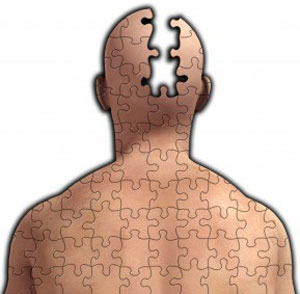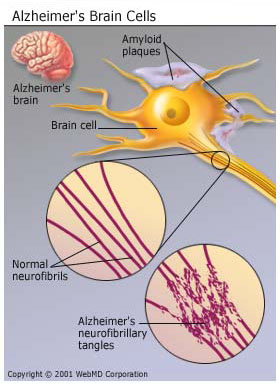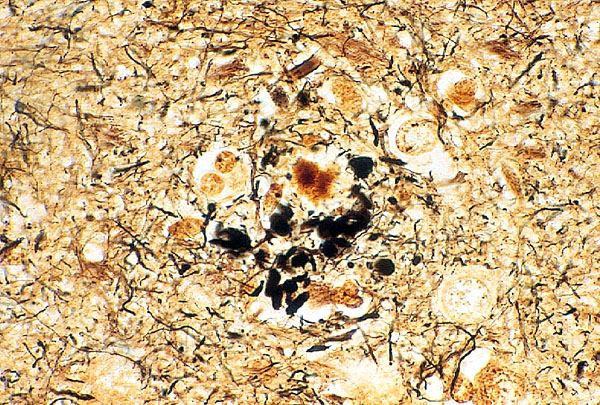Lesson 37: Late Life Cognition and Memory
Attention

Learning Outcomes
Upon completion of this lesson's material, students will be able to:
- Identify patterns of memory loss in late life that are "normal" vs. "abnormal"
- Define real-world examples of wisdom in late life
Teaching
Changes in cognition and memory as we age cannot be separated from the neurological changes that occur during this time.
Here are some change that occur on the neurological/brain level as we age:
- Neurofibrillary Tangles---for reasons unknown, fibers that compose the axon sometimes become twisted together to form spiral shaped masses (this is associated with symptoms of Alzheimer's Disease)
- Neuretic Plaques---damaged and dying neurons sometimes collect around a core of protein
- Reduced levels of neurotransmitters

Neurofibrillary Tangles associated with Alzheimer's

Neuretic Plaques
Cognitive Processes
What changes in cognitive processing actually do occur as we grow old?
Psychomotor Speed
This is the speed at which we can make a specific response...we might call it "reaction time". People slow down as they get older.
- May explain other cognitive changes
- Decrease in brain white matter which aids in neurological transmission
Memory
Click here to download a brief paper related to memory loss in late life
We have all heard the phrase "I'm having an Alzheimer's moment"...but do all old people lose their memory?
To understand the answer to this question, we need to review the different kinds of memory:
- Episodic Memory---memory of specific events in time (this seems to decline)
- Semantic Memory---remembering meanings of words and concepts (does not seem to decline)
- Autobiographical Memory---memory of events during one's life
- People remember more vivid memories from their own lives when they were 10-30 years old than when they were older
- Less details in the older folks' memories
Concern about memory loss in the elderly has more to do with how that memory loss impacts functioning and anxiety.
Having memory aids can help a person function better with memory loss
- External aids are environmental such as notebooks and calendars
- Internal aids rely on mental processes such as imagery
Creative Output
Overall, creative output tends to increase through the 30's, peak in the early 40's, and decline thereafter...though there are ample examples of individuals who are creative late in life.
Wisdom
What does it mean to be wise? Her are four characteristics of wisdom:
- Wisdom deals with important or difficult matters of life and the human condition
- Wisdom is truly "superior" knowledge, judgment, and advice
- Wisdom is knowledge with extraordinary scope, depth, and balance that is applicable to specific situations
- Wisdom, when used, is well intended and combines mind and virtue
Assessment

Lesson 37 Quiz
- Based on your experience in your interviews for the biography project, what memory patters (including memory loss) did you note in your conversations? For instance, was it easier for your subject to remember events from their ages 10-30 than later, as is indicated in the notes? Does your subject's memory "problems" interfere with their functioning?